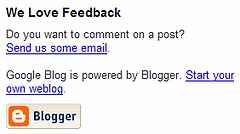No matter how much ad-placement algorithms improve the inevitable mistake happens from time to time. The article on Yahoo News discusses how Eastern European countries who agree to host the US missile defense system risk being targeted by Russian missiles. Now, what better ad to display, than a cute little Yahoo Rocket? 
Of course this is not as extreme as this ad right after Katrina hit New Orleans:

See also:




 ), but that carries the risk of the Playbook becoming just another discussion forum. Perhaps we should all heed the advice under
), but that carries the risk of the Playbook becoming just another discussion forum. Perhaps we should all heed the advice under 

 (Updated)
(Updated) They claim they love feedback: but the only way to leave feedback is by emailing them. Hm, not much of “love” here, if you ask me.
They claim they love feedback: but the only way to leave feedback is by emailing them. Hm, not much of “love” here, if you ask me.

Recent Comments